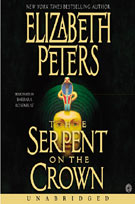
This is the first Amelia Peabody book I've read--and to be completely and pointlessly honest, I listened to in from Audible.com. Apparently there are quite a few of these--set in time starting in 1884 up to 1923 or so. This one is 1921 or 22--Tutankhamen's tomb has not yet been discovered, although Howard Carter is hovering around the edges of the story, and "everyone" agrees that there are no more new royal tombs in the Valley of the Kings.
Amelia is married to Egyptologist Professor Emerson, and with their grown son Ramses, his wife Nefret, and their four year old twins, they excavate and inevitably get mixed up in mysteries and murder. In this book, the Emersons are approached by a Lady Novelist, who gives them a priceless solid gold statuette, claiming there is a curse on it that killed her husband. The lady then goes missing, only to be found after a week--dead. The Emersons need some additional assistance on their team, and are approached by a German who worked on digs before The War, and a Russian who can decipher papyri.
The family endures a number of attacks on their home and their members, as thieves attempt to take the priceless statuette. They do not believe in a curse, but they do wish to know were the statute came from originally, as they have never seen anything like it.
I suppose better knowledge of the characters would have given me a better understanding of what the hell was going on most of the time. As it was, I found this to be an extremely slow moving mystery. The total reading time of the audiobook was around 10 hours, and I was already more than halfway through before the first body showed up.
The Emersons are gruff, tempermental, veddy veddy English, and hard to warm up to. They order the police around, and seem to run Luxor for their own interests--yet there is a sense that they skirt the racism that would be normal for their time. There is what appears to be some solid archeological foundation to the book--the Emersons get permission to re-excavate a tomb known as KV55, and what I found about it on the internet was precisely how Peters described it.
Nevertheless, it was an unsatisfying mystery. The murder is solved when the murderer makes a dying confession--and reveals that he had assumed somebody else's identity. So there were no clues, no decent suspects--the mystery seemed to get solved offstage. There were some lingering threads that turned out to be completely unrelated: there were at least two people running around attempting murder at the same time, but neither had anything to do with the other.
It was a pleasant enough listen, and there is something inherently Romantic about the tombs of Ancient Egypt--but I think it may be unfair for me to just jump into this series at book 16 (more or less). I could go back and read the earlier ones and see if it changes my opinion about this one.
No comments:
Post a Comment